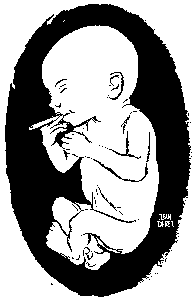
A new study by the School of Public Health at the University of California states that parental smoking increases the risk of blood cancer among their children. In a seven-year study, 327 children who had acute lymphoblastic leukemia (ALL) or acute myeloid leukemia (AML) were examined and 416 healthy children were examined. During the study, data was collected on the parents' smoking, before they gave birth to children and after. The analysis of the results of the study shows that the father's smoking before the mother's pregnancy increases the risk of the child being born with AML by almost four times and the risk of ALL by 30%. The child's risk of contracting ALL is highest when the father smoked before the mother's pregnancy, when the mother smoked after the pregnancy and the birth of the child, and when the child was exposed to passive smoking. The study's conclusions proved that parental smoking before, after, and during pregnancy and the child's exposure to secondhand smoke increase the child's risk of developing blood cancer. The study was published in the latest issue of the American Scientific Journal of Epidemiology.
Meanwhile, it became known that in another new study by the cancer center at the University of Minnesota, data was discovered indicating additional destructive results of parental smoking near their child. In the study, urine samples from 144 babies were tested and it was found that 47% had a carcinogenic chemical substance (NNAL), which is created in the human body only when exposed to the dangerous substance called NNK, found in cigarette smoke. The level of material found in the study was high compared to similar studies in the past. The parents of the babies in whom the carcinogenic substance was found, reported during the conduct of the study about smoking about half a pack of cigarettes a day, at home or in the car, when the baby was near them. In another study, the urine of babies whose mothers smoked during pregnancy was tested immediately after birth and it was found that they contained a higher level of the carcinogenic chemical NNAL compared to the level found in this study. The researchers' conclusion was that although the study showed prolonged exposure of the babies to passive smoking and carcinogenic substances while still in their mother's womb and after birth, at a stage when they are growing and developing at a rapid pace, it is still not possible to determine what the consequences of this long exposure will be on the genes of these babies. The study was published in the latest issue of the scientific journal Cancer, Epidemiology and Prevention.
Prof. Eliezer Robinson, the chairman of the Cancer Society responded that: "The results of this study reinforce the knowledge that has been accumulating in the hands of scientists in recent decades, which proves that passive smoking has a direct and harmful impact on the health of people who do not smoke. In this case, the parents' smoking has a direct impact on the health of their children. It is important to understand that passive smoking is actually forced smoking that causes children who do not smoke to inhale into their lungs cigarette smoke smoked by the adults who are near them. The smoke emitted into the air space from the cigarette and the smoker's mouth contains a similar amount of chemicals as the smoker himself inhales into his lungs, despite the fact that the smoke dissolves in the air. Children who are around people who smoke, are forced to inhale smoke in the same way as the smokers themselves, thus becoming, so to speak, smokers"
More facts about smoking during pregnancy
• Avoiding smoking is one of the most important recommendations of the Cancer Society for pregnant women. Studies prove beyond any doubt that a woman who smokes during pregnancy harms both her health and the health of her baby, and even endangers her life. Therefore, pregnant women who smoke are among the high risk group during pregnancy.
• According to the data of the Cancer Society, there are about 4,000 chemicals in cigarette smoke, about 43 of which have been proven to be carcinogenic. Every time a pregnant woman inhales cigarette smoke into her lungs, she introduces into her blood stream and that of the fetus in the womb the toxic substances in the cigarette, which harm the normal development of the fetus. Smoking causes damage to vital functions of the fetus, such as: an increase in heart rate and blood pressure and a reduction in breathing movements. Defects, such as cleft lip and palate, heart defects and more were also observed with a relatively high frequency.
• According to the data of the Cancer Society, women who smoke during pregnancy often give birth to babies whose birth weight is lower than if they had not smoked, which may have a negative effect on the baby's overall development and health status. Among women in this group there are also more cases of premature birth, ectopic pregnancy, stillbirth and infant deaths shortly after birth.
• Also, according to studies collected by the Cancer Society, there is a connection between the mother's smoking during pregnancy and the chance of her children getting respiratory diseases, between the chance that they themselves will become smokers, and even between their academic achievements.
• Smoking while breastfeeding is also harmful to the health of the baby, who may absorb an amount of nicotine that can harm his health.
